Sovereign Soil
David Curtis
2019
| 91 min
Selections and Awards
Official SelectionGuelph Film Festival, Guelph, Canada (2019)
Official SelectionYellowknife International Film Festival, Yellowknife, Northwest Territories, Canada (2019)
Official Selection Available Light Film Festival, Whitehorse, Yukon, Canada (2020)
Official SelectionTromsø International Film Festival, Tromsø, Norway (2020)
Official SelectionReFrame Film Festival, Peterborough, Ontario, Canada (2020)
Official Selection Santa Barbara International Film Festival, Santa Barbara, California, United States (2020)
Official Selection One World International Human Rights Documentary Film Festival, Prague, Czech Republic (2020)
Official Selection Festival du Film Canadien de Dieppe, Dieppe, France (2020)
Official Selection Modos de Comer (Ways of Eating) Festival, Portugal (2020)
Official Selection Wild & Scenic Film Festival, Nevada City, California, United States (2021)
Winner Crimson Snowflake Award International Festival of Winter Cinema, Edmonton, Canada (2021)
Nominee - Emerging FilmmakerYorkton Film Festival, Saskatchewan, Canada (2021)
Nominee - Documentary Science/Nature/Technology Yorkton Film Festival, Saskatchewan, Canada (2021)
At the far-flung edge of Canada’s boreal forest, outside the tiny sub-Arctic town of Dawson City, Yukon, a handful of unlikely farmers are growing everything from snow-covered Brussels sprouts to apples. These modern-day agrarians have carved out small patches of fertile soil in an otherwise unforgiving expanse of isolated wilderness to make a living and a life.
Over the course of a year, Dawson filmmaker David Curtis follows these resilient, unassuming farmers—including a German immigrant, a young family that taps birch trees for syrup, a First Nations youth, and a matriarch who can shoot and quarter a moose—exploring life, death, and time through the simple, rich day-to-day of people deeply tied to the wilds.
Sovereign Soil is an ode to the beauty of this ferocious, remote land and the wisdom of those who’ve chosen to call it home.
At the far-flung edge of Canada’s boreal forest, outside the tiny sub-Arctic town of Dawson City, Yukon, a handful of unlikely farmers are growing everything from snow-covered Brussels sprouts to apples. These modern-day agrarians have carved out small patches of fertile soil in an otherwise unforgiving expanse of isolated wilderness to make a living and a life.
One young family taps birch trees for syrup, homeschooling their children in the steam of boiling sap, and lovingly scratching the rumps of their pigs before slaughter. A third-generation German horticulturalist, struggling to keep moose out of his radishes, alters Dawson’s food supply while facing the limits of agriculture in the North. The Tr’ondëk Hwëch’in youth, raised hunting and trapping, who now weeds rows of lettuce on his self-governing First Nation’s teaching farm; the couple grafting fruit trees; the tomato wizard grappling with chronic illness; and the matriarch who can shoot and quarter a moose, are all in it for the same reason—a profound love of the land.
Dawson filmmaker David Curtis follows these resilient, unassuming farmers over the course of a year, watching as the heavy dark of winter gives way to the incessant summer sun. And as the seasons pass, time slows and transforms, reshaping notions of what really matters through the simple, rich day-to-day of people deeply tied to a life in the wilds.
Sovereign Soil is an ode to the beauty of this ferocious, remote land and the wisdom of those who’ve chosen to call it home.
One-liner
Set in the northern wilds surrounding the tiny sub-Arctic town of Dawson City, Yukon, Sovereign Soil is an ode to the beauty of this ferocious, remote land and the wisdom of those who’ve chosen to call it home.
Q&A with director David Curtis
What inspired Sovereign Soil?
Yukon filmmaker Andrew Conners and I wanted to work together on a project, and we were both interested in the back-to-the-land movement and how it’s played out in the Yukon. Working with the NFB, we decided to integrate contemporary lives and look at modern-day food producers outside Dawson City, Yukon. We wanted to look at what makes people come into the bush and eke out a subsistence living. It’s hard work surviving out there. Lots of people come north with this romantic notion of living in the wilds, but as soon as the first snow comes, they tend to scatter. We’re looking at those who stuck it out.
It’s a wide demographic. There’s a former hippie from downtown Toronto who came north and ended up becoming a successful market gardener, homesteading and raising a family on a remote island in the Yukon River. There’s a DIY German immigrant who’s a third-generation horticulturalist exploring the limits of sustainability in Canada’s North; a young family living off the grid in the wilds but still fully connected with Wi-Fi, and there are some from that older generation where back-to-the-land is about survival and self-sufficiency more than community.
You grew up with a strong connection to the land; how did this help shape the film?
I was raised in small Prairie towns and in the Northwest Territories. My parents emigrated from Ireland and they loved this country and wanted to experience all of it, so we moved around a lot. My dad was a fixer for cooperatives—general stores that deal in everything small rural communities need. He got assigned to be a fur trader for the Coop in the Dene community of Deline, NWT, and this had a big influence on me. I’ve always loved the natural environment and felt most comfortable in the wilds, but Deline was magical to me. This is what brought me back to the North. I’ve been living off-grid outside Dawson for the past 21 years—working as a commercial salmon fisher, carpenter, artist, and teacher.
Living here, I became more and more interested in the principles and philosophy behind living on the land and sustainability. And how our Western, colonial frame of mind has imposed itself on Indigenous ways of life. I’m interested in how we can have a more equitable relationship with the planet. And in Sovereign Soil I am looking at all this through food production.
Sovereign Soil is about sustainable food production, but it’s also about so much more. Can you speak to this a bit?
A lot of films and media are looking at this subject in a very focused and particular way. But I’m not a documentary filmmaker who goes in and asks questions, then lays out the facts. I prefer people to come to their own conclusions.
Sovereign Soil is a big exploration, with friends and neighbours, of what is at the core of people’s spiritual and philosophical connection to the land. It deals with life and death, seasonal cycles, notions of time, and how people are living custodially, in relative equilibrium with nature.
Can you talk more about why this connection to the land is so significant today?
Our disconnect from the land is at the core of our potential demise. From the disrespectful ways we consume resources and pollute land, to the unprecedented issues and catastrophes we’re facing due to climate change. People don’t spend time experiencing the seasons and connecting with their environment. We don’t realize we are still part of nature and so dependent on it, until it slaps us in the face and our home is flooded, or a forest fire burns us out. We have to have a more reciprocal relationship with nature to get back in touch with what is happening around us.
What are you hoping people will take away from Sovereign Soil?
I always intended the film to raise more questions than answers. I hope people leave thinking more about their consumer impact on the environment, their relationship to the land, and about the people and industries that supply them with food.
Agriculture is one of the biggest polluters in the world. Our modern way of producing food is really not sustainable. As one of the characters says in the film, the only really sustainable way is hunting and gathering. But now we have the local Tr’ondëk Hwëch’in First Nation, who once were hunter gathers, turning to agriculture for food security. This raises very important questions about community, our changing connections to land, and self-sufficiency. What is our fundamental relationship to food, the people who produce it, and the land where it is produced?
Can you talk about the challenges of making a film about your friends and neighbours?
I started off having honest, deep conversations with each one of them to make sure they felt comfortable with the themes we’d be exploring together. And at any point if they felt intruded upon, I’d back off. I also felt it was unfair that I ask my neighbours and friends to give of themselves and their time without giving something back. So I’ve been pitching in—planting and harvesting potatoes, weeding, collecting birch sap, cooking dinners, teaching workshops, building fences—throughout the making of the film, and I continue to do so.
I didn’t want to come in and make a film, then take off and reap the benefits. Documentary filmmaking often objectifies or exoticizes people. I wanted to create a reciprocal relationship with the participants.
What were some challenges in making Sovereign Soil?
Logistically, snowmobiling in the middle of December at minus 25, or canoeing in summer carrying $30,000 worth of gear and portaging it across islands, lugging everything to access these remote locations, proved challenging. But then boating, hiking, skiing, or snowmobiling in all types of weather—I love it. It’s what I do.
What did you take away?
Making this film I gained a much deeper appreciation and respect for people who choose to live a life like these people have, to provide food for others. They are passionate about what they do. And making this film, I learned more about my own passion for the wilderness and how my living in it has impacts, seen and unseen.
Ultimately though, I just have this absolute sense of joy, having been welcomed into these peoples’ lives. I was given such trust. And I hope the film respects that.
Trailer
Clip: Brussels sprouts
Clip: Birch syrup
Clip: First Nations sustainability
Images
Loading...
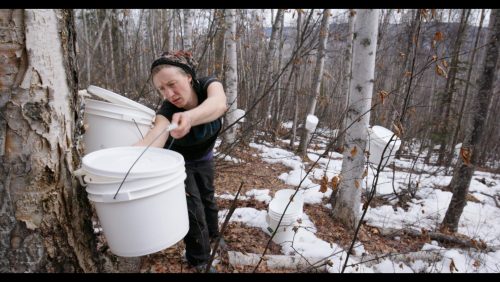
Download
Loading...
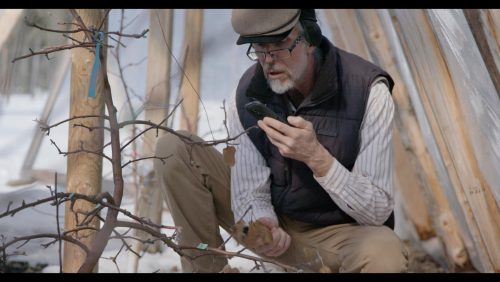
Download
Loading...
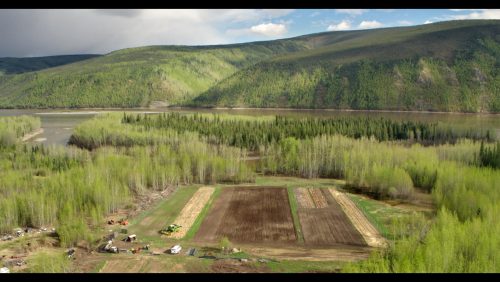
Download
Loading...
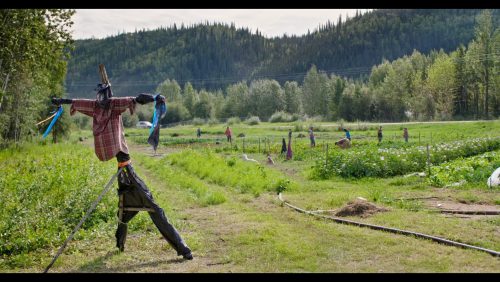
Download
Loading...
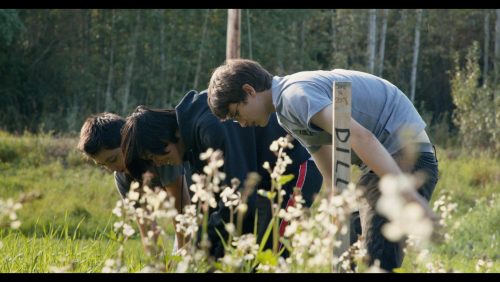
Download
Loading...
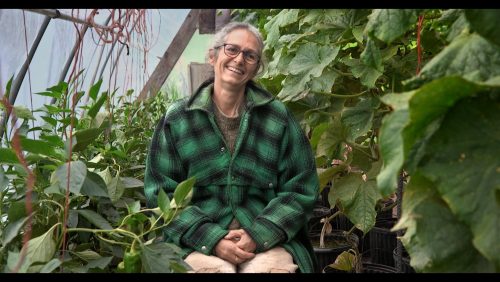
Download
Loading...
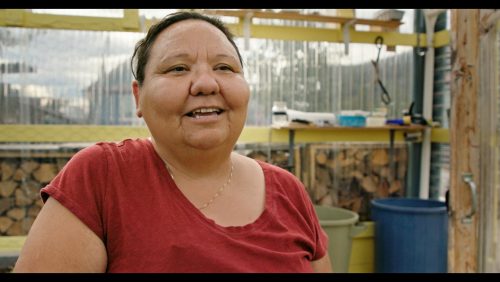
Download
Loading...
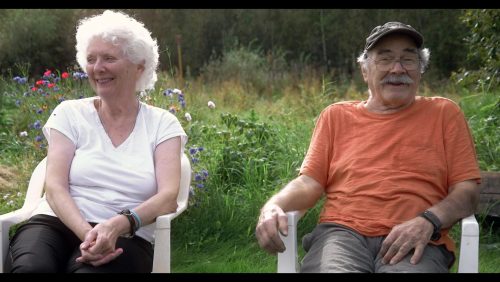
Download
Loading...
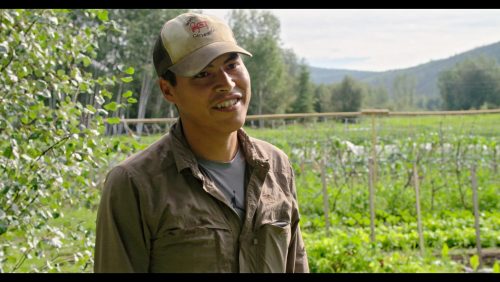
Download
Loading...
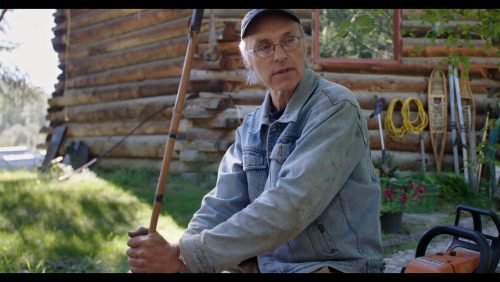
Download
Loading...
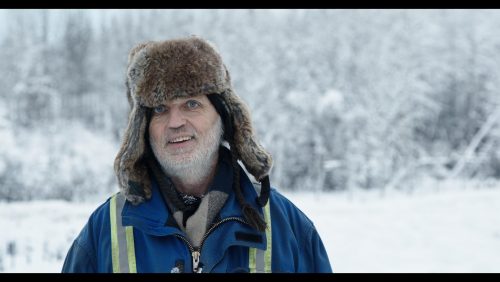
Download
Loading...
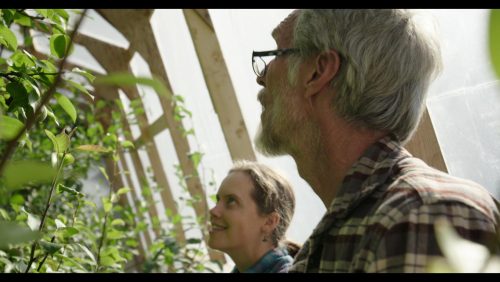
Download
Loading...
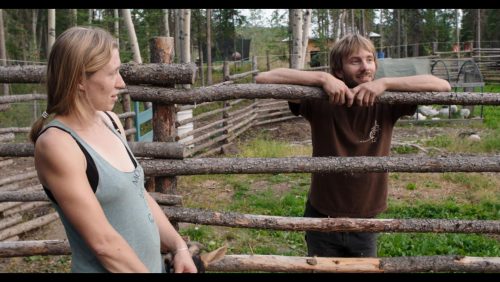
Download
Promotional Materials
Team
David Curtis
Director
Photo
Andrew Connors
Producer (Jackleg Films)
Photo
Photo : Gary Bremner Photography
Shirley Vercruysse
Producer (NFB)
Photo
Photo : Emily Cooper
Credits
Jackleg Films
In co-production with The National Film Board of Canada
present
In association with Northwestel Community Television
With the participation of Canada Media Fund
With the participation of Yukon Media Development
Sovereign Soil
Filmed on the traditional territories of the Tr’ondëk Hwëch’in and the First Nation of Na-Cho Nyäk Dun, in and around Dawson City and the McQuesten River Valley, Yukon.
Writer and Director
David Curtis
Producers
Andrew Connors
Shirley Vercruysse
Director of Photography
John Price
Editor
Graham Withers
Composer
Daniel Janke
Location Sound and Aerial Photography
Michael Code
Featuring
Sylvia Frisch
Berwyn Larson
Selwyn Frisch
Lillia Larson
Jackie Olson
Otto Muehlbach
John Lenart
Kim Melton
Josh Moses
Grant Dowdell
Karen Digby
Gerry Couture (In Memoriam)
Jan Couture
Angie Joseph-Rear
Paul Derry
Tiffany Taylor
Derrick Hastings
Also Appearing
Ryota Kubo
Norma Blanchard
Rickie Mawunganidze
Nick Rear
Graham Rudge
Erica Barta
Angela Edmunds
Emilie Aubin
Sasha Fergusson
Julia Sabrina Staudt
Dillan Taylor
Mike Taylor
Gareth Hoskisson
Cathie Findlay-Brook
Zach Yeager
Adam Titus
Nate Van Every
Warren Walters
Antoine Gerard
Donald Dunwoodie
Zach Everitt,
Guy Couture
Meredith Couture
Mistie Couture-Bogard
Thierry Guenez
Éléna Lacombe
Thierry Bégin
Dogs
Cherry
Luna
Itszay
Oz
Dash
Masie Mae
Loki
Peggy
Sunny
Carlos
Bannock
Sparky
Macy
Tucker
Paddy
Production Manager
David Curtis
Additional Camera
David Curtis
Marty O’Brien
Patrick McLaughlin
Andrew Connors
Neil Macdonald
Mike Code
Evelyn Pollock
Additional Location Sound
James Healey
Daniel Janke
René-Paul Singh
Marty O’Brien
Emile Bouffard
Additional Editing
David Curtis
Leah Byrne
Jessica Hall
Assistant Editor
Alexandra Knowles
Data Technicians
Alexandra Knowles
Angela Edmunds
James Healey
Evelyn Pollock
Sound Editing and Design
Stackwall Sound
Sound Editor
Jordy Walker
Post Production Sound
Post Modern Sound
Sound Mixers
Angelo Incoloyannis
Greg Stewart
Credits Design
Naomi Mark
Side Street Post Production
Colourist
Kip Lightburn
Online Editor
Kevin Reid
Project Manager
Alisa Luke
Archival Photographs
Courtesy of The Couture Family
Archival Technician
Janice Cliff
Transcriptions
Alexandra Knowles
Alicia Bickle
Transportation
Jonathan Dowdell
Catering
Red Mammoth Café
Conny Handwerk
Emile Bouffard
Legal Services
Heather Watt, Boughton Law Corporation
Insurance
Front Row Insurance
Accounting & Bookkeeping
Numbers Production Services
Baker Tilly WM LLP
National Film Board BC & Yukon Studio
Associate Producer
Teri Snelgrove
Line Producer
Jennifer Roworth
Technical Coordinator
Wes Machnikowski
Studio Administrator
Carla Jones
Production Coordinator
Kristyn Stilling
Marketing Manager
Kay Rondonneau
Publicist
Katja De Bock
Executive Producer
Shirley Vercruysse
Thank you to all the participants
Molly Macdonald
Wade Lamarche
Wayne Potoroka
Jonathan Dowdell
Clayton Buhler
Megan Waterman
Dre Lasse
Chief Roberta Joseph
Ben Mogl-Maclean
John Steins
Tim Gerberding
Julie Frisch
Karen DuBois
Simone Rudge
Mercedes Taylor
Lynne Rear (In Memoriam)
John Lodder,
Byrun Shandler
Jackey Clancy
James Hedch
Trae Taylor
Michelle Charlie
Tyrell Hearty
Paul Blanchard (In Memoriam)
Jessi-John Whalen
Randy Lewis
George MacLeod
Kate Willams
Brian Bizzell
Dakota Hagan
SPECIAL THANK YOU
Tr’ondëk Hwëch’in Government
Michelle Van Beusekom
The Potoroka Family
Chris Clarke
Eileen and John Curtis
Katherine McCallum
Whitehouse Cabins
Emile Bouffard
Chris McNutt
Richard Lawrence
Iris Merritt
Betsy Carson
Charles Wilkinson
Tina Schliessler
John Walker
Max Fraser
Conny Handwerk
Itszay
all citizens of Dawson City
THANK YOU
Tr’ondëk Hwëch’in Farm staff and workers,
Kokkopellie Farm
Klondike Valley Nursery
Uncle Berwyn’s Birch Syrup
Bonanza Market
Lastraw Ranch
Tr’ondek Hwech’in Heritage Department
Georgette MacLeod
Sue Parsons
Debbie Nagano
Jody Beaumont
Air North
Na Ho Productions
Trew Audio
Alchemy Café
Arctic Star Printing
Design Station
Klondike Kate’s
M. McKay & Associates
Tucker Carruthers
Heather Watt
Fusion Ciné
Hot Docs International Film Festival
Midnight Sun Coffee Roasters
Yukon Nissan
Dawson City Museum
Arctic Institute of Community-Based Research
Francis Bouffard
Galen Clarke
Fiona Curtis
Steven Brekelmens
Kildare Curtis
Jennifer MacKie
Dave Husby
Cari Tangedal
Jennifer Duncan
Jake Duncan
Nettie Wild
Daniel Cross
Daniel Johnston
Gerald Isaac
Bekah Miller
Michelle Latimer
Evelyn Pollock
Joe Cooke
Julie Frisch
Karen DuBois
Eldo Enns
Dan Sokolowski
Suzanne Crocker
Joe Bone
Darren Tate
Martin Qesku
Colin Bowes
Rob Toohey
Lulu Keating
Dexter MacRae
Joe Powell
Nicole Becker
Michelle Ross-Stanton
Tova Krentzman
Ross Burnet
Heather Horton
Roland Schlimme
Henry Connors
Guin Lalena
Tony Berto
Andrew Seymour
Charles Atlas Sheppard
Kerry Barber
Mary Clarke
Dan LeBrun
Monina Wittfoth
Bill Kenrdick
Carmen Pollard
Trans North Helicopters
Monica Keen
John Dippong
Mike Gravitis
Takashi Sakurai
Dave Husby
Ann Bernier
Victor Henry
Aaron Kirklyvich
Rachel Hunt
Andrew Taylor
Carl Taylor
John Wain
Songs
New Country
ⓟ © 2019 Daniel Janke, all rights reserved, S.O.C.A.N.
Ernie Tollar – clarinet
Daniel Morphy – percussion
Daniel Janke – piano and electronics
River Town
ⓟ © 2019 Daniel Janke, all rights reserved, S.O.C.A.N.
Mark Fewer – violin
Aaron Schwebel – violin
Roderick McLeod – viola
Paul Widner – cello
Tim Dawson – contrebasse
Words For Snow
ⓟ © 2016 Daniel Janke, all rights reserved, S.O.C.A.N.
Mark Fewer – violin
Aaron Schwebel – violin
Roderick McLeod – viola
Paul Widner – cello
Tim Dawson – contrebasse
Martha Blacks Reel
ⓟ © 1996 Daniel Janke, all rights reserved, S.O.C.A.N.
violin – Adele Armin
prepared piano – Daniel Janke
V’la le bon vent
ⓟ © 2004 traditional, arranged by Daniel Janke, all rights reserved, S.O.C.A.N.
violin – Mark Fewer
piano – Daniel Janke
Jackleg Films
NFB
In association with Northwestel Community Television
Produced with the participation of
Canada Media Fund
Developed and produced with the participation of
Yukon Media Development
Canadian Film or Video Production Tax Credit
Government of Canada
Production and Post Production Services
DGC
WGC
Side Street Post
Post Modern
Lodestar Productions
Midnight Light Media
Yukon Film Society
© 2019 Sovereign Soil Inc. and the National Film Board of Canada
Sovereignsoilfilm.com
Media Relations
-
About the NFB
Founded in 1939, the National Film Board of Canada (NFB) is a one-of-a-kind producer, co-producer and distributor of engaging, relevant and innovative documentary and animated films. As a talent incubator, it is one of the world’s leading creative centres. The NFB has enabled Canadians to tell and hear each other’s stories for over eight decades, and its films are a reliable and accessible educational resource. The NFB is also recognized around the world for its expertise in preservation and conservation, and for its rich and vibrant collection of works, which form a pillar of Canada’s cultural heritage. To date, the NFB has produced more than 14,000 works, 7,000 of which can be streamed free of charge at nfb.ca. The NFB and its productions and co-productions have earned over 7,000 awards, including 11 Oscars and an Honorary Academy Award for overall excellence in cinema.
-
About Jackleg Films
Jackleg Films is a film and media production company based in Whitehorse, Yukon, that was incorporated in 2015. Its sole director is filmmaker Andrew Connors, who has more than 20 years’ experience writing, directing and producing films for broadcast and distribution.